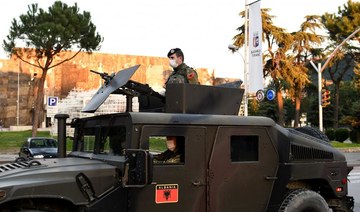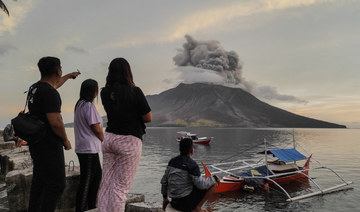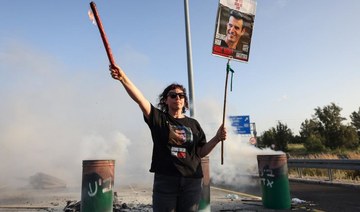TIRANA: Stuck in their Tirana flat under a coronavirus lockdown, 81-year-old Osman Hoxha and his family quietly mark the start of Ramadan, recalling the communist era when practicing religion meant risking death.
Like many parts of the world, mosques in Muslim-majority Albania are eerily empty while iftar supper tables have fewer chairs than normal as families shelter at home to curb the spread of the virus.
For older generations, the intimate settings inevitably stir up memories of how they were forced to furtively keep their faith alive under the long and brutal reign of the late communist dictator Enver Hoxha, who outlawed religion.
“We had to pray behind the walls of our homes for fear of ending up in prison or being sentenced to death,” remembers Osman, wearing a black cap and grey vest, after the first day of fasting in his Tirana home.
Decades later, the country faces a different kind of enemy.
“During communism we had to observe fasting discreetly because if someone saw us it could cost us our lives, whereas today we risk death from a virus that can kill you,” says Osman’s wife Minire, 74.
Enver Hoxha, the dictator whose common surname Osman’s family shares, adopted the Marxist motto that religion was the “opium of the people” and declared Albania the world’s first atheist country in 1967.
Under his 40-year reign, hundreds of mosques and churches were destroyed or transformed, dozens of priests and Muslim clerics were sentenced to hard labor and many others died in prison or were murdered by firing squad.
In total, some 6,000 people were executed by the paranoid regime for alleged crimes ranging from treason to foreign travel or practicing a faith.
Tens of thousands more were sent to prisons or camps for forced labor or internment.
Among them was Osman.
As a young man in the 1960s, he was forced to work at a stone quarry after his brother fled the country, bringing suspicion on the rest of his relatives.
But the family nevertheless nurtured their faith, practicing Islam in secret until houses of worship were able to reopen in 1990, just before communism collapsed.
The country has since seen a religious revival. More than half of the 2.8 million population identifies as Muslim, mostly of a moderate strand, while around 30 percent are Catholic and Orthodox Christians.
In recent decades, Osman’s family has been celebrating the iftar meal with some 20 people at their dinner table.
This year the group is down to seven, among them the grandparents, their son Agron and his wife and children.
“I wish this table was big and my house could be full of friends and relatives,” Minire said as she prepared supper with her daughter-in-law Rezarta.
“Fasting when you’re housebound is harder because all you think about is eating,” she added with a smile, looking over an enticing spread of rice and meat, salads, roasted vegetables and dates.
After the iftar, Osman led his son and two grandsons, aged 11 and 13, in prayer in the living room.
Now a democracy, Albania has followed much of the world in severely curbing individual freedoms to combat the virus, which has claimed nearly 30 lives.
New technologies, however, are easing the loneliness.
Ahead of their meal, Osman’s family pulled out mobile phones to speak with their other relatives over video chats.
“Thanks to technology and social networks, virtually we are closer than ever to our friends,” said Agron.
His mother added: “The important thing is to be in good health, because we can still respect all the rites and religious practices in the family.”
bme-ev/ssm/ach
In Albania, Ramadan under lockdown revives memories of communism
https://arab.news/j5fcd
In Albania, Ramadan under lockdown revives memories of communism
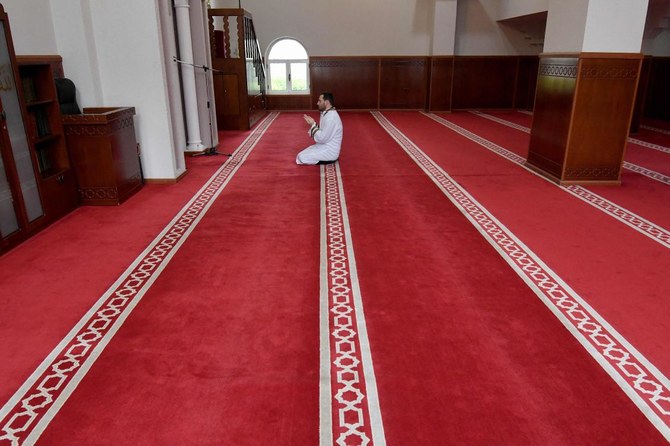
- Like many parts of the world, mosques in Muslim-majority Albania are eerily empty while iftar supper tables have fewer chairs than normal as families shelter at home to curb the spread of the virus
- The intimate settings inevitably stir up memories of how they were forced to furtively keep their faith alive under the long and brutal reign of the late communist dictator Enver Hoxha
Philippine bishops instruct flock to pray for rain, heat relief
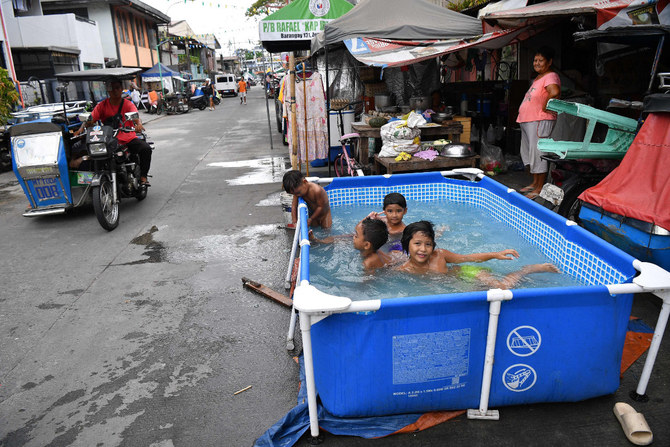
- Rising temperatures have forced the government to shut down tens of thousands of schools over the past week
- Increased demand has also stressed the country’s already strained power supply
MANILA: Catholic bishops in the Philippines are pitching in to seek divine relief from the extreme heatwave scorching the country, instructing their flock to recite special prayers for rain and lower temperatures.
Rising temperatures have forced the government to shut down tens of thousands of schools over the past week, while increased demand has stressed the country’s already strained power supply.
A widespread El Nino drought that began early this year is compounding the problem, ruining 5.9 billion pesos ($103 million) worth of farm produce so far according to the Department of Agriculture.
The Catholic Bishops Conference of the Philippines issued an “Oratio Imperata,” instructing parishes in the mainly Catholic nation to recite a prayer for deliverance from calamities during masses, according to the text seen by AFP on Saturday.
“We humbly ask you to grant us relief from the extreme heat that besets your people at this time, disrupting their activities and threatening their lives and livelihood,” the prayer read.
“Send us rain to replenish our depleting water sources, to irrigate our fields, to stave off water and power shortages and to provide water for our daily needs.”
A record-high 38.8 degrees Celsius (101.8 degrees Fahrenheit) was recorded in the capital Manila on April 27, forcing the closure of more than 47,000 schools for two days.
Nearly 8,000 schools remained shuttered as of Friday, the education department said, while the highest temperature in the country was recorded at 38.2C on the island of Mindoro south of the capital.
Indonesia to permanently relocate 10,000 people after Ruang volcano eruptions
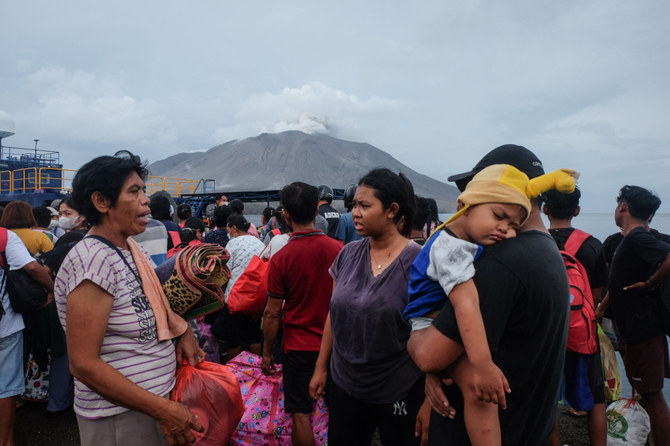
- Authorities warned of the a possible tsunami if parts of the mountain collapse into the surrounding waters
- Indonesia straddles the “Pacific Ring of Fire,” an area of high seismic activity where multiple tectonic plates meet
JAKARTA: The Indonesian government will permanently relocate almost 10,000 residents after a series of explosive eruptions of the Ruang volcano has raised concerns about the dangers of residing on the island in future, a minister said on Friday.
About 9,800 people live on Ruang island, in the province of North Sulawesi, but in recent weeks all residents have been forced to evacuate after the mountain has continued to spew incandescent lava and columns of ash kilometers into the sky.
Authorities this week raised the alert status of the volcano to the highest level, closed the provincial airport in Manado, and also warned of the a possible tsunami if parts of the mountain collapse into the surrounding waters.
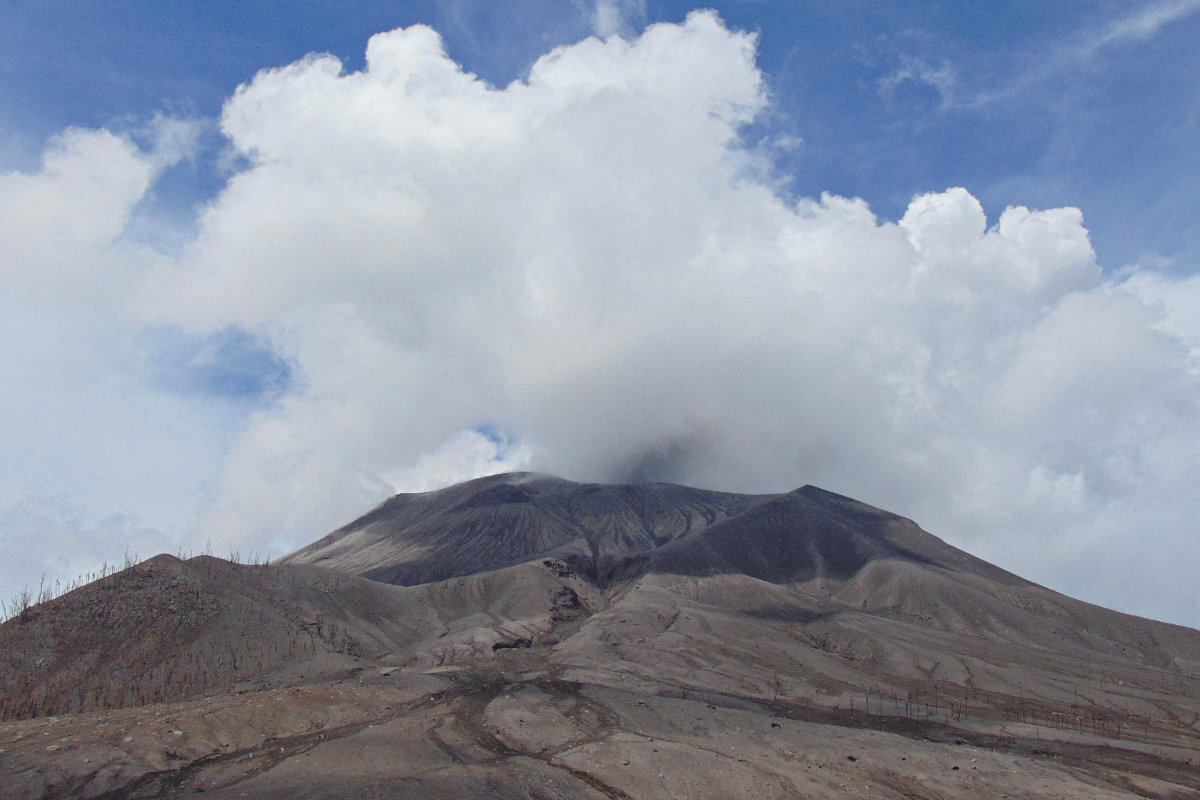
Hundreds of “simple but permanent” homes would be built in the Bolaang Mongondow area to facilitate the relocations, said coordinating human development minister Muhadjir Effendy, after a cabinet meeting to discuss the volcano on Friday.
“As instructed by President Joko Widodo, we will build houses that meet disaster-standards,” he said, adding that the site was located about 200 km (125 miles) from Ruang island.
Mount Ruang began to dramatically erupt last month, with experts saying the eruptions were triggered by increased seismic activity, including deep sea earthquakes.
The mountain erupted again on Tuesday, causing damage to some homes and forcing residents to evacuate from the Tagulandang island, where they had initially sought refuge, to the provincial capital of Manado.
Roads and buildings on Tagulandang were blanketed in a thick layer of volcanic ash, and the roofs of some homes had collapsed, according a Reuters witness.
The volcano had not erupted on Friday but Manado’s Sam Ratulangi Airport remained closed until the evening due to the spread of volcanic ash.
Indonesia straddles the so-called “Pacific Ring of Fire,” an area of high seismic activity where multiple tectonic plates meet.
US congressman praises heckling of war protesters, including 1 who made monkey gestures at Black woman
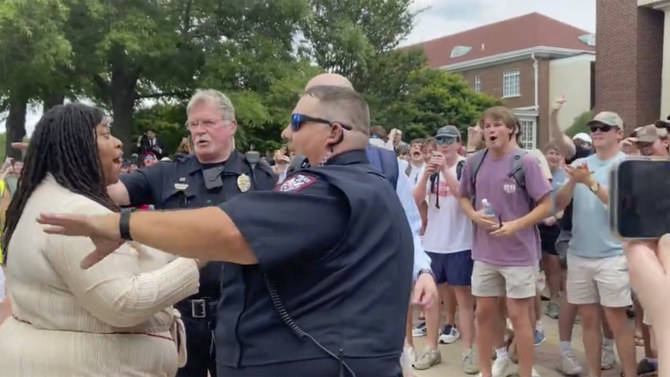
JACKSON, Mississippi: Israel-Hamas war demonstrations at the University of Mississippi turned ugly this week when one counter-protester appeared to make monkey noises and gestures at a Black student in a raucous gathering that was endorsed by a far-right congressman from Georgia.
“Ole Miss taking care of business,” Republican US Rep. Mike Collins wrote Friday on the social platform X with a with a link to the video showing the racist jeers.
The Associated Press left voicemail messages for Collins on Friday at his offices in Georgia and Washington and sent an email to his spokesperson, asking for an explanation of what Collins meant. There was no immediate response.
The taunting brought sharp criticism on and off campus.
“Students were calling for an end to genocide. They were met with racism,” James M. Thomas, a sociology professor at the University of Mississippi, wrote Friday on X.
The Rev. Cornell William Brooks, a former president and CEO of the NAACP and professor at the John F. Kennedy School of Government at Harvard University, wrote on X that a white man mocking a Black woman as a monkey “isn’t about ‘Stand With Israel’ or ‘Free Palestine.’ This is protest as performative racism.”
Collins was first elected to Congress in 2022 and made several social media posts criticizing campus protests.
Nobody was arrested during the demonstration Thursday at the University of Mississippi, where hecklers vastly outnumbered war protesters. According to a count by AP, more than 2,400 arrests have occurred on 46 US university or college campuses since April 17 during demonstrations against the war.
The student newspaper, The Daily Mississippian, reported about 30 protesters on the Oxford campus billed themselves as UMiss for Palestine. Videos and photos from the event showed the protesters were in a grassy area near the main library, blocked off by barriers erected by campus security.
They chanted “Free, free Palestine,” and carried Palestinian flags and signs with slogans including, “Stop the Genocide” and “US bombs take Palestine lives.”
Student journalist Stacey J. Spiehler shot video that showed campus police officers and the dean of students standing between anti-war protesters and hecklers. After the Black woman protesting the war had what appeared to be a heated exchange of words with several white hecklers, one of the men made the monkey gestures and noises at her.
About 76 percent of the university’s students were white and about 11 percent were Black in 2022-23, the most recent data available on the school’s website.
University of Mississippi Chancellor Glenn Boyce said the school is committed to people expressing their views. He said some statements made on campus Thursday were “offensive and unacceptable.”
Republican Gov. Tate Reeves reposted a video on X that showed counter-protesters on the campus singing “The Star-Spangled Banner.”
“Warms my heart,” Reeves wrote. “I love Mississippi!”
US campus protests wane after crackdowns, Biden rebuke
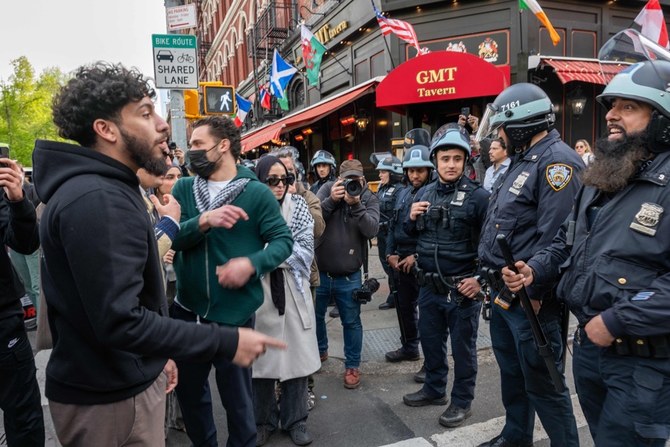
- More than 2,000 arrests have been made in the past two weeks across the US
NEW YORK: Pro-Palestinian protests that have rocked US campuses for weeks were more muted Friday after a series of clashes with police, mass arrests and a stern White House directive to restore order.
Police in Manhattan cleared an encampment at New York University after sunrise, with video posted to social media by an official showing protesters exiting their tents and dispersing when ordered to do so.
The scene appeared relatively calm compared to crackdowns at other campuses around the country — and some worldwide — where protests over Israel’s war against Hamas in Gaza have multiplied in recent weeks.
University administrators, who have tried to balance the right to protest and complaints of violence and hate speech, have increasingly called on police to clear out the demonstrators ahead of year-end exams and graduation ceremonies.
At the University of Chicago, law enforcement appeared set to dismantle an encampment Friday after the school’s president said talks with protesters on a compromise had failed.
Before the clearing operation began, dozens of American flag-wielding counter-protesters showed up and confronted the pro-Palestinian group, but police separated the two sides, local media reported.
More than 2,000 arrests have been made in the past two weeks across the US, some during violent confrontations with police, giving rise to accusations of use of excessive force.
President Joe Biden, who has faced pressure from all political sides over the conflict in Gaza, gave his first expansive remarks on the protests Thursday, saying that “order must prevail.”
“We are not an authoritarian nation where we silence people or squash dissent,” Biden said in a brief address from the White House.
“But neither are we a lawless country. We’re a civil society, and order must prevail.”
His remarks came hours after police moved in on demonstrators at the University of California, Los Angeles, which had seen a violent confrontation when counter-protesters attacked a fortified encampment there.
A large police contingent forcibly cleared the sprawling encampment early Thursday while flashbangs were launched to disperse crowds gathered outside.
Schools officials said that more than 200 people were arrested.
On the US East coast Thursday, protesters at New Jersey’s Rutgers University agreed to take down their camp after reaching a compromise with administrators — a similar deal to one made at Brown University in Rhode Island.
Republicans have accused Biden of being soft on what they say is anti-Semitic sentiment among the protesters, while he faces opposition in his own party for his strong support for Israel’s military offensive.
“There should be no place on any campus, no place in America for anti-Semitism, or threats of violence against Jewish students,” Biden said.
Education Secretary Miguel Cardona echoed the condemnation in a letter to university leaders on Friday, pledging to investigate reports of anti-Semitism “aggressively,” CNN reported.
Meanwhile, similar student protests have popped up in countries around the world, including in Australia, France, Mexico and Canada.
In Paris, police moved in to clear students staging a sit-in at the Sciences Po university.
An encampment has grown at Canada’s prestigious McGill University, where administrators on Wednesday demanded it be taken down “without delay.”
However, police had yet to take action against the site as of Friday.
The Gaza war started when Hamas militants staged an unprecedented attack on Israel on October 7 that resulted in the deaths of more than 1,170 people, mostly civilians, according to an AFP tally of Israeli official figures.
Israel estimates that 128 hostages remain in Gaza. The Israeli military says 35 of them are dead.
Israel’s retaliatory offensive has killed more than 34,600 people in Gaza, mostly women and children, according to the Hamas-run territory’s health ministry.
Biden to host Jordan king next week amid Gaza talks

- Hamas accused Israeli Prime Minister Benjamin Netanyahu on Friday of trying to derail the proposed Gaza deal with his threats to launch an operation in Rafah
- Israel has killed more than 34,000 Palestinians in Gaza, mostly women and children, according to the health ministry in the Hamas-run territory
WASHINGTON: US President Joe Biden will host Jordan’s King Abdullah II next week, the White House said Friday, as negotiations continue in the Middle East for a ceasefire in Gaza.
The meeting will be “private” and will be followed by a readout, White House Press Secretary Karine Jean-Pierre told reporters, without giving a date for the encounter.
The meeting comes against the backdrop of talks for a deal to release hostages and secure a ceasefire between Israel and Hamas in Gaza after nearly seven months of war.
The talks, which come after months of efforts by mediators Egypt, Qatar and the United States to broker a new agreement between the combatants, are at a critical juncture.
The United States has urged the Palestinian militant group to accept the “extraordinarily generous” offer.
But Hamas accused Israeli Prime Minister Benjamin Netanyahu on Friday of trying to derail the proposed Gaza deal with his threats to launch an operation in Rafah.
King Abdullah II last visited the White House in February when he called for an immediate ceasefire and warned an attack on Rafah would cause a “humanitarian catastrophe.”
In April, Jordan worked alongside the United States and other allies to shoot down Iranian drones that Tehran sent toward Israel, with the kingdom keen to avoid a wider conflict.



